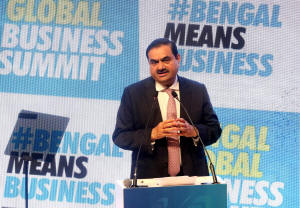Explainer-How India's Adani Group moved stealthily to acquire NDTV stake
 Send a link to a friend
Send a link to a friend
 [August 24, 2022] By
Munsif Vengattil and M. Sriram [August 24, 2022] By
Munsif Vengattil and M. Sriram
NEW DELHI (Reuters) - When India's richest
man Gautam Adani unveiled plans for his firm to control a majority stake
in New Delhi Television (NDTV) on Tuesday, it was the stealth approach
in executing the transaction that drew most attention in the news
industry.
This is how the firm controlled by the Adani family went about planning
the takeover along with NDTV's options, outlined by lawyers.
A COMPANY CALLED VCPL
At the heart of Adani Group's two-stage plan to snap up a majority stake
in NDTV is a little-known Indian company called Vishvapradhan Commercial
Private Limited (VCPL), founded in 2008.
More than a decade ago, NDTV founders Radhika and Prannoy Roy took a 4
billion Indian rupees ($50 million) loan from VCPL, and in exchange
issued warrants that allowed the company to acquire a 29.18% stake in
the news group.
Those warrants were convertible at any time. Adani Group said on Tuesday
it had acquired VCPL and exercised those rights, which should give it
the 29.18% stake.
NDTV said it has been given two days to transfer all the shares to the
now Adani Group-owned VCPL.
Adani Group's takeover bid is without NDTV's consent, the news
organisation said in a statement hours after the announcement.
Internally, an NDTV memo referred to the move as "entirely unexpected."

The memo added the company was "in the process of evaluating next steps,
many of which involve regulatory and legal processes," without
elaborating further.
AN OPEN OFFER
Adani Group's indirect control over a stake above 25% means it must put
forward an open offer to purchase at least 26% more from existing
shareholders to give them an opportunity to exit, according to Indian
regulations.
[to top of second column] |

Indian billionaire Gautam Adani
addresses delegates during the Bengal Global Business Summit in
Kolkata, India April 20, 2022. REUTERS/Rupak De Chowdhuri/File Photo

Laying out its plan, the Adani Group said the open offer will be at 294 rupees
per NDTV share for a total consideration of up to $62 million. At the full
take-up, this would give it 55.18% of the popular news network.
The price was at an unusual 20.5% discount to NDTV's close of 369.75 rupees,
though shares had surged in the last month.
FOUNDERS NOT IN DIVESTMENT TALKS
The day before Adani Group's plans became public, NDTV said in a stock exchange
disclosure that the Roy founders were not in talks with any entity for a change
in ownership or a divestment of their stake in NDTV.
If the Adani Group deal succeeds, the founding duo will hold around 32% of NDTV,
the internal memo stated.
WHAT IS NEXT FOR NDTV?
Although NDTV has said the move was without its consent, four lawyers who spoke
to Reuters on Wednesday said that Adani Group is well within its legal rights in
the deal process so far.
NDTV, they said, has limited options.
The founders could try to stall Adani Group's bid by alleging breach of contract
and approach an Indian court for relief, said one Indian law firm partner
specialising in M&A transactions.
Another lawyer said NDTV should have seen this coming as its founders had issued
warrants to VCPL years ago and there was always a possibility a company could
execute them to acquire a stake.
One option would be for the owners to make their own open offer at a higher
price to try to increase their stake.
(Reporting by Munsif Vengattil in New Delhi, M. Sriram and Abhirup Roy in Mumbai
and Nivedita Bhattacharjee in Bengaluru; Editing by Aditya Kalra and Jamie
Freed)
[© 2022 Thomson Reuters. All rights
reserved.]This material may not be published,
broadcast, rewritten or redistributed.
Thompson Reuters is solely responsible for this content. |